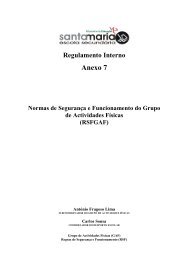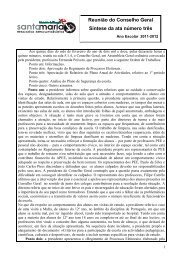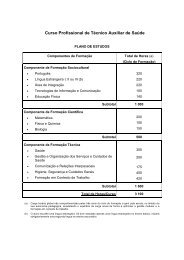You also want an ePaper? Increase the reach of your titles
YUMPU automatically turns print PDFs into web optimized ePapers that Google loves.
Work done by:<br />
Class 10. CE.BC<br />
Legends of Sintra<br />
Mediadora: Anabela Ovídio<br />
Formadora: Maria do Céu Rocha<br />
Formandos: Alexandre Cerqueira<br />
Ana Silva<br />
Bianca Pereira<br />
Felipe Alberto<br />
Luís Alegre
Legend of Seteais<br />
Seteais is one of the most<br />
beautiful corners of Sintra. Its<br />
name dates back to 1147, when<br />
D. Afonso Henriques won Lisbon<br />
and Sintra.<br />
According to the legend, a<br />
Christian knight, D. Mendo de<br />
Paiva, has found a secret door<br />
through which many Moors were<br />
running away. Among them,<br />
there was a very beautiful girl, accompanied by her maid.<br />
When she saw the young man, and feeling she couldn’t escape, she<br />
sighed.<br />
But D. Mendo decided to make this young girl prisoner. Then, she sighed<br />
again. Her maid started to be worried and told the young man that this<br />
girl had been cursed by a witch and would die on the day she gave seven<br />
woes.<br />
The revelation of this secret made the Moorish sigh again. The knight<br />
didn’t believe the story, which caused another sigh of the girl. Then, he<br />
made both prisoners and she sighed again. The poor old woman was<br />
desperate, because the girl had already sighed five times.<br />
Meanwhile, the knight went to get a quiet place to take them.<br />
But a group of Moors appeared and cut off the head of the maid. The girl<br />
sighed for the sixth time. And the seventh sigh was when she saw the<br />
sword falling on her neck.<br />
D. Mendo came back and was very sad . Then he decided to give that<br />
corner the name of Seteais, in honor to the beautiful Moorish.<br />
Legend of Peninha<br />
It is said that during the reign<br />
of D. João III, in the land of<br />
Almoínhos- Velhos, there was<br />
a dumb shepherdess, who<br />
used to take her sheep to<br />
graze on the top of the<br />
mountain.<br />
One day one of her sheep ran<br />
away leaving the young<br />
shepherd desperate in search<br />
of such sheep.<br />
After looking for so long, she finally found a woman, who was carrying her<br />
sheep. As she couldn’t speak, she thanked the woman the way she could.<br />
Then the woman asked the shepherd to give her some bread, but the girl<br />
explained her, with her hands, that she had no bread for her, because the<br />
year had been bad. Then the old woman told her:<br />
- When you get home, call your mother and get me some bread.<br />
The girl tried to explain that it was impossible, because neither she had<br />
bread at home, nor she could call her mother, because she was dumb. But<br />
the woman insisted in such a way that the girl decided to do what she was<br />
asking for.<br />
When she arrived at home, she called her mother and her voice was heard<br />
all over the house.<br />
Then she told her mother all the story and rushed to find bread. Both were<br />
surprised when they found inside an ark full of bread enough for the<br />
entire village.<br />
The next day, as a proof of gratitude, the entire village went up the<br />
mountain and on the site where the shepherd had found the lady, was<br />
now a grotto with the image of Nossa Senhora.<br />
This place became sacred and later a chapel was built there, known as<br />
the Chapel of Nossa Senhora da Peninha.
Legend of Cabo da Roca<br />
The legend says that, near Cabo<br />
da Roca, a little boy of about five<br />
years old, disappeared from home<br />
and his mother didn’t know where<br />
to find him. She already imagined<br />
him fallen into the sea and<br />
drowned. She imagined him dead.<br />
But the truth was different. Some<br />
witches had taken him from home<br />
and threw him onto a cliff, on a<br />
hill overlooking the sea.<br />
As the little boy cried a lot, some shepherds appeared and gave the news<br />
to the village. Then many villagers and the sad mother rushed together to<br />
rescue the little boy.<br />
It was a complicated task to take the boy from the hole, but they did it. All<br />
glad to see him safe and sound, they asked him who had taken him there<br />
and who had given him food. Then the boy explained that some women<br />
had taken him there by air and threw him into this pit. However, every day<br />
a beautiful Lady came there with soup for him.<br />
After knowing the truth, everybody went to the church to thank Nossa<br />
Senhora. When the boy came into the church, and looking at the image of<br />
Nossa Senhora, he immediately recognised her and said: “Mother, here is<br />
the Lady, who gave me the soup everyday”<br />
This boy named José Gomes, is known in Cascais by his nickname,<br />
Chapinheiro, where you can find evidences of this miracle.<br />
Legend of Monserrate<br />
Tradition says that in times<br />
of Arab rule, a young Arab<br />
lived in that place.<br />
This young boy had a quarrel<br />
with the mayor of Sintra’s<br />
castle and this led to a duel<br />
between them. In this duel<br />
the young Arab died and<br />
was lying on the ground.<br />
He was soon taken as a<br />
martyr by the population, who raised a tomb and later a chapel in this<br />
place.<br />
This small chapel collapsed, being replaced by another in 1500, built by<br />
Padre Gaspar Preto, under the invocation of Nossa Senhora de<br />
Monserrate, whose image, made of alabaster, was brought from Rome.<br />
Legend of Gruta da Fada<br />
Cave formed by a large granite rock,<br />
based on two rocks.<br />
According to the legend, every night<br />
a fairy comes there, around<br />
midnight, to mourn her fate.<br />
This cave in on the road to Pena,<br />
near the main gate of Parque da Pena.
Legend of Palácio Nacional de Sintra<br />
In Palácio Nacional de Sintra<br />
there is a room whose ceiling is<br />
painted with different drawings<br />
of magpies.<br />
It is said that the king and the<br />
queen, who lived there,<br />
arranged marriages for more<br />
than one hundred women and<br />
at the time there were no illicit<br />
relationships or adultery.<br />
The court was a school. D.<br />
Filipa was considered an example of a wife, but terrible in her meekness<br />
brought her husband on thorns.<br />
One day, according to the legend, the king was kissing the face of one of<br />
the maids and suddenly the queen appeared, accusatory and serious,<br />
without a word, but with a ghastly air. D. João, ashamed and worried just<br />
told her:<br />
“Foi por bem”. The queen left the room, feeling her pride wounded.<br />
Quickly the news spread throughout the palace and all the maids<br />
repeated the phrase “Foi por bem”.<br />
Upset with the situation, the king decided to take an initiative and built a<br />
room for the staff. All were overjoyed and counting the days until the<br />
room was ready.<br />
That room was finally opened and everybody was astonished when they<br />
saw that the ceiling was painted with magpies, whose beaks had written<br />
"Por bem."<br />
Legend of Penedo dos Ovos (pedra amarela)<br />
In the middle of Sintra’s<br />
mountain, there is a big rock<br />
placed there by nature or<br />
caused by volcanic eruption.<br />
It was said that under this<br />
rock an enchanted treasure<br />
was hidden, which belonged<br />
to anyone who was able to<br />
knock down the rock, throwing<br />
eggs against it.<br />
Then an old woman decided to start collecting eggs, in order to get the<br />
treasure. She took all the eggs to the rock and, one by one, she threw all<br />
of them against it. When there was none left she felt disappointed,<br />
because the rock was still firm, washed with eggs.<br />
And so, instead of falling into the ground, uncovering the wonderful<br />
treasure, fell to the ground the dreams and hopes of the woman.<br />
Even today people see in that rock the yellow colour of the eggs thrown<br />
into it.
Legend of Convento dos Capuchos<br />
Frei Honório, a man of great<br />
faith and virtues, highly<br />
respected by the inhabitants of<br />
the neighbourhood, has lived in<br />
that place for 30 years and his<br />
body lies still in the church of<br />
this convent.<br />
Once upon a time Frei Honório<br />
met a beautiful girl in the<br />
countryside, but he didn’t look at<br />
her. However, the girl forced him to do something: she wanted him to<br />
confess her right there. The monk told her that he couldn’t do that there,<br />
because it was not the right place and sent her to the convent in search of<br />
another confessor. But the girl insisted, not satisfied with the answer.<br />
Red as a tomato and sweating, it was August, the monk quickened his<br />
pace, always followed by the beautiful girl.<br />
Then, he covered his face with one hand to escape the beauty of the girl<br />
and, with the other, he made the sign of the cross. The girl started<br />
shouting, running away immediately and nobody else has seen her again.<br />
So, Frei Honório isolated himself, on bread and water, in a cave of that<br />
convent, as a punishment of having fallen in temptation and he stayed<br />
there till the end of his life.








